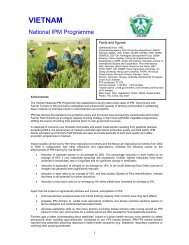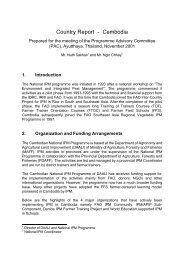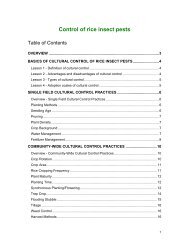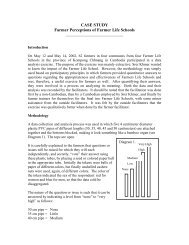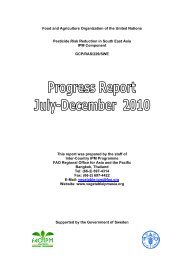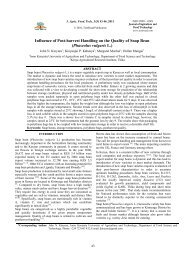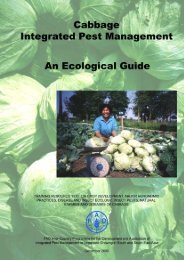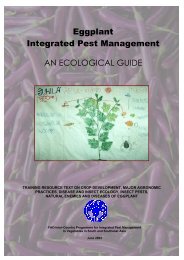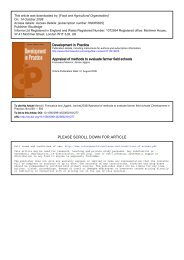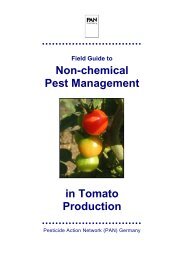Sustainable Potato Production - Guidelines for - FAO.org
Sustainable Potato Production - Guidelines for - FAO.org
Sustainable Potato Production - Guidelines for - FAO.org
- No tags were found...
You also want an ePaper? Increase the reach of your titles
YUMPU automatically turns print PDFs into web optimized ePapers that Google loves.
Research <strong>for</strong> development agendaAccelerated and sustainabledevelopment of the potato subsectorin developing countries requiresincreases in the productivity,profitability and sustainability of potatobasedfarming systems. This implies a newand vigorous research <strong>for</strong> developmentagenda.The way <strong>for</strong>ward <strong>for</strong> potato research indeveloping countries will include a numberof priority areas. First, the lack of adequatequantities of clean seed is a majorbottleneck to improved productivity.Promising results have been obtainedthrough extension ef<strong>for</strong>ts that promote theuse of “positive selection” and small-scaleseed plots. Other research work aimed atimproving the quality of farmers’ seedthrough novel technologies such asaeroponic production of clean seed tubershas yielded positive results. Strongconsideration should be given to fosteringpublic-private sector partnerships as astrategy <strong>for</strong> getting potato seed systemsmoving in developing countries. Alsorecommended are ex-ante assessments ofthe potential return on investments bycalculating the impact of new adaptedvarieties and cleaner seed.In many countries, investments areneeded in laboratories <strong>for</strong> the diagnosis ofpotato diseases, <strong>for</strong> measuring mineralconcentrations in soils, manure andfertilizers, and <strong>for</strong> determining thecomposition and concentration of activecompounds in herbicides, pesticides,fungicides and nematicides.Legislation is needed in many countriesto set quality standards <strong>for</strong> seed and tointroduce or en<strong>for</strong>ce mechanisms <strong>for</strong>certification through accredited laboratories.Legislation may also be needed to protectpotato breeders’ rights.The potential effects of climate changepose a threat to the levels and stability ofpotato yields. Heat and drought resistanceshould be considered in breedingprogrammes along with other key traitssuch as late-blight resistance, virusresistance, earliness and culinary qualities.Hence, research needs to provide a broaderrange of genetic material that meets sitespecificcriteria, is adaptable to changingenvironments, and meets new demandsfrom emerging markets <strong>for</strong> processed foodproducts, non-food ingredients and starch<strong>for</strong> industry. The growing demand <strong>for</strong> potatowith specific characteristics <strong>for</strong> a particularprocessed product must be taken intoconsideration, but should only be pursuedafter a careful analysis of market prospects.The potato subsector faces a growingchallenge from more aggressive strains oflate blight and many developing countrieshave a limited capacity to control the diseasethrough fungicide application. Continuedresearch on resistance breeding andintegrated management strategies isessential, while support is needed <strong>for</strong> scalingup LB control technologies andmethodologies developed by CIP.It is unlikely that resistance to latentbacterial wilt infection will be availablethrough conventional breeding in the near71IMPLICATIONSFOR POLICYAND RESEARCH



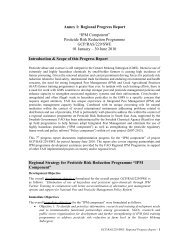
![Section 4 [ PDF file, 252 KB] - The Field Alliance](https://img.yumpu.com/51387260/1/158x260/section-4-pdf-file-252-kb-the-field-alliance.jpg?quality=85)
